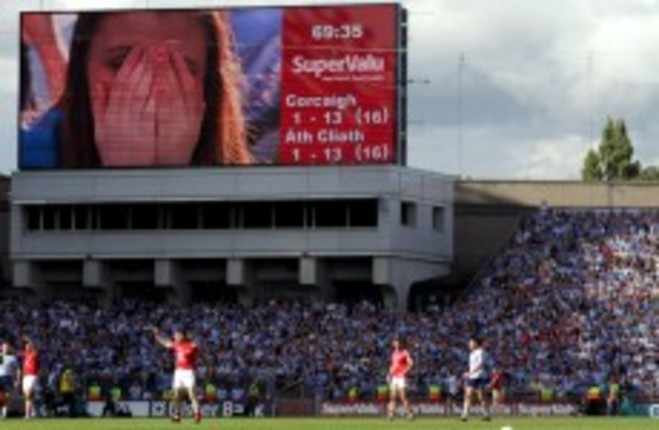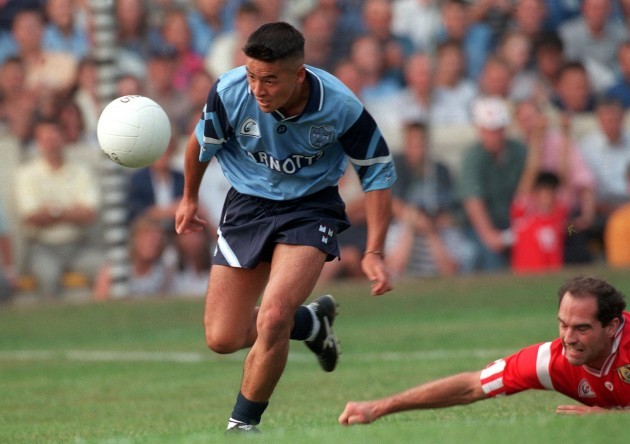ROUND THESE PARTS, we much prefer to look forward than to look back. Life’s just more fun that way.
However, when it comes to Dublin versus Cork, it seems wasteful to let a chance go by without reflecting on the many ding-dong battles which litter both counties’ past. GAA is usually quite a straightforward game but, when the Rebels and the Jacks go toe-to-toe it seems that anything can happen. Literally.
Here are five of our favourites.
1. The one with the 16th man
(All-Ireland Senior Football semi-final, 1974)
If tomorrow’s game goes to the wire as many expect it to, it might be worthwhile having a quick count of the number of players on the pitch to see if either Pat Gilroy or Conor Counihan have tried to sneak a little bit of an advantage by surreptitiously adding a 16th man.
Unusual as it sounds, there is a precedent for such behaviour, set in the 1974 All-Ireland semi-final when Cork somehow managed to end up with an extra player on the pitch mid-way through the second half.
Quite how it happened, nobody knows – or at least nobody is willing to publicly admit. With the match-day officials fighting fire following their decision to award a dubious penalty to Cork, the Munster men tried to make a substitution, switching Martin Doherty for Ned Kirby.
Oblivious to the fact that he had been subbed, Kirby stayed on the pitch, celebrating Jimmy Barry Murphy’s calmly dispatched spot kick before going back to forage and fight in the half-back line.
One man who knew exactly what was going on was Dubs supremo Kevin Heffernan. He raced onto the pitch to haul Kirby off only for the oblivious Corkman to send him back to the sideline.
In the end, dodgy penos and extra men counted for nothing as the Dubs won out by 2-11 to 1-8.
2. The one with the dash for the train
(National Football League quarter-final, 1987)
The 1987 league quarter-final clash between the two sides has entered into folklore and rightly so.
With 70 minutes played, the game was tied, a young Cork side and the more established Dubs proving to be inseparable. As Dublin headed back to their dressing room to discuss tactics and prepare for extra time, the visitors apparently did likewise.
Or not, as it turned out.
It may have been a mix-up or it may have been the most stunning piece of gamesmanship ever seen on these shores. Either way, Cork announced that they wouldn’t be playing extra-time.
As the officials tried to work their way through the chaos, the Cork selectors first claimed that they hadn’t been informed that extra time would be played (some of them had, it transpired, but the message hadn’t been circulated to all).
Then, with the players changed and adamant that they weren’t playing on, came the icing on the cake. Cork announced that couldn’t afford to stand around and debate the relative merits of extra time as they had a train to catch.
And off they went, leaving the Dubs to retake the field alone, win the uncontested throw-in, and launch it to Barney Rock who scored into the empty net to seal victory.
3. The one with Jayo’s goal
(All-Ireland Senior Football semi-final, 1995)
If there’s one name that’s synonymous with Dublin’s All-Ireland charge in 1995, it has to be Jason Sherlock.
Remember him? The guy who lost his boot and still scored a cracker in the Leinster Championship against Laois – ring any bells?
Sherlock was Dublin’s wonderkid that summer, a 19-year-old prodigy who seemingly had the capability to turn any game on its head by himself.
Before he burst onto the scene, Dublin had been knocking on Sam Maguire’s door for a few years, picking up runners-up medals in 1992 and 1994. Dangerously close to becoming the nearly men of their era.
On a different day, it could have so easily been disappointment for the Dubs yet again. The semi-final showdown against Cork in Croke Park was close, as evidenced by the fact that only a single goal separated the teams at the death, the game finishing 1-12 to 0-12.
The goal came from Sherlock – naturally – who displayed self-confidence beyond his years, skinning one of the game’s great full backs in Mark O’Connor before firing across the goal and into the far corner.
The Dubs had their hero. A couple of weeks later, they had “their” Sam as well.
4. The one with the Cork comeback
(All-Ireland Senior Football semi-final, 2010)
Outside the two counties in question, last year’s All-Ireland semi-final might well have been regarded as the battle of the bottlers – two self-professed footballing heavyweights, one All-Ireland title between them in the past twenty years.
By the end of the seventy minutes, the bottlers tag rested firmly with the county in blue.
From the moment that star forward Bernard Brogan had latched on to a dropping ball to open his account with a first-minute goal, the weight of expectation and anticipation surrounding Dublin’s All-Ireland prospects redoubled. After 15 years in the wilderness, they now had a crucial advantage. The finishing line, however, could not be further away.
On paper, Dublin held firm for 69-and-a-half minutes, but the cracks had started to show long before that.
Sloppy in possession, wasteful in shooting, indisciplined in the tackle. The cumulative effect of Dublin’s errors left the door ajar, allowing Cork to chip away at a lead which had stood at five points with a little over 20 minutes remaining.
Donncha O’Connor’s last-minute free merely confirmed on the scoreboard what had been a reality on the pitch for the final quarter of the game. Dublin’s nerve had deserted them, allowing Cork to swoop in for the kill.
5. The one with the leaky defence
(National Football League, 2011)
The most recent encounter between the two teams is instructive if only because it provides us with the most up-to-date evidence of what we can expect tomorrow.
With the wounds of last summer still raw, Dublin launched the “Spring Series” in Croke Park with redemption on their minds. In that respect, a scoreline of 3-13 to 0-16 certainly served its purpose but when the game is considered as a whole, a six-point margin of victory may have flattered to deceive.
Reflecting on the match earlier this week, both Bryan Cullen and Donncha O’Connor were quick to point out that Dublin’s three goals were something of an aberration, unlikely to reoccur in too many future meetings between the two sides.
Since then, Cork have worked hard to shore up their “leaky” defence (as O’Connor described it) while Dublin have continued to focus on accuracy in the final third of the pitch, converting possession into points.
Both sides are adamant that the weekend’s match will not define their seasons, win or lose. Placed alongside the February fixture, however, it may just give us a timely indication of both sides’ relative trajectory as we prepare for Championship lift-off.


